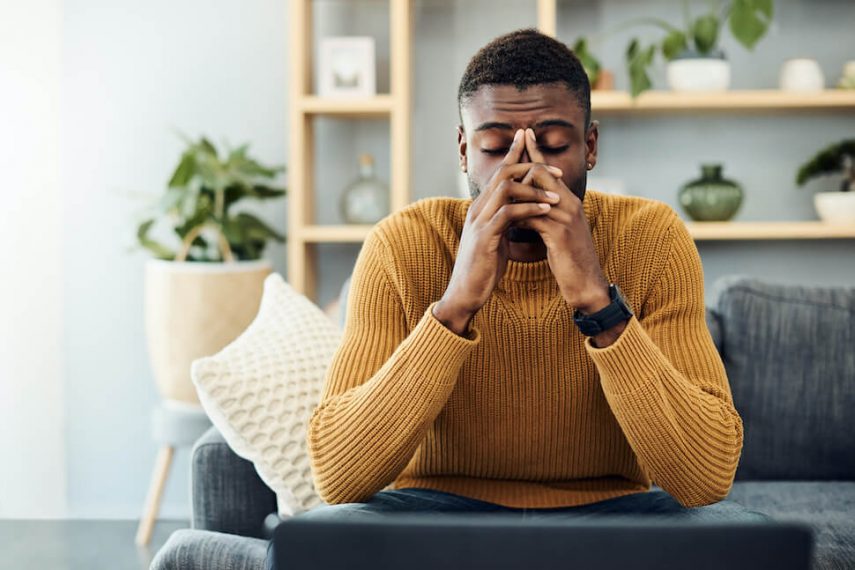How Anxiety Affects the LGBTQ Community

Anxiety is a major mental health issue in the LGBTQ community. These individuals have a higher risk than the general population for anxiety and anxiety disorders. Stigma, discrimination, microagression, and trauma all contribute to stress and feelings of anxiety. The complications of untreated anxiety can be serious and even include suicide. It’s important to reach out and connect with others, to engage in a healthy lifestyle, and to get professional help when needed.
LGBTQ individuals have an increased risk for many types of mental illness, including anxiety disorders. The reasons include stigma, threats and trauma, discrimination, anti-LGBTQ legislation, rejection by family, and so much more.
If you or someone you care about is a member of the LGBTQ community, be aware of the prevalence of anxiety. You don’t have to settle for being anxious.
Many factors protect against anxiety, especially social support and connection. Of course, professional treatment is also essential. Speak with a mental health care professional if you cannot cope on your own.
Facts About Anxiety in the LGBTQ Community
Numerous statistics and indicators show that LGBTQ individuals experience more mental illness than the general population. They have a higher risk of experiencing mental health issues and for being suicidal. Here are some of the facts specifically about anxiety in the LGBTQ community:
- LGBTQ individuals are more than twice as likely as heterosexual and cisgender people to have a mental illness of any type.
- Between 30 and 60 percent of LGBTQ individuals struggle with anxiety and depression, a rate that is 1.5 to 2.5 times higher than in other communities.
- Young adults and teens in the community have much higher rates of anxiety, depression, and suicide than their peers.
- Young members of the LGBTQ community are especially vulnerable to social anxiety.
- During the coronavirus pandemic, more than half of young LGBTQ individuals reported having anxiety.
- Studies show that 40 percent of transgender women and 47 percent of transgender men have anxiety.
- Researchers see the highest rates of anxiety in people who identify with emerging terms like pansexual, asexual, or questioning as compared to transgender and gay, lesbian, or bisexual.
Why Is Anxiety So High Among LGBTQ Individuals?
There are many reasons that people in the LGBTQ community struggle more with mental health and particularly anxiety. Every individual has their own unique challenges, but there are also a lot of commonalities that contribute to elevated anxiety and anxiety disorders.
Stigma is a big component of anxiety for LGBTQ individuals. While the world and attitudes are changing, stigma still exists. People in this community still face ridicule, rejection, discrimination, and even trauma and victimization.
The above, studies have shown, can lead to hypervigilance, a heightened and chronic state of being alert and at the ready. This, not surprisingly, can leave anyone feeling more anxious. People in this situation report feeling overwhelmingly afraid, fatigued, and anxious.
Another overarching explanation is something called minority stress. Anyone in any type of oppressed minority has an increased risk of all types of mental health issues, particularly stress and anxiety. At the foundation of minority stress are microagressions, prejudiced actions and statements, and discrimination.
At the most extreme end of minority stress is trauma. LGBTQ individuals who have experienced assault, threats, or other traumatic events are more likely to have anxiety as a result.
Sources of anxiety for LGBTQ people can be found everywhere, from personal, everyday experiences to political actions. One study of bathroom bills targeting transgender individuals found that LGBTQ participants had much more anxiety leading up to votes on these bills. That anxiety only found relief if the result of the vote retained their rights.
Many young people struggled more with mental health during the COVID pandemic. Those in the LGBTQ community suffered more, according to a survey. They were more likely to feel anxious and depressed because of the pandemic. Those affected the most were Black LGBTQ youth. Many also reported limited access to mental health care.
Consequences and Complications of Unmanaged Anxiety
Anxiety for anyone can cause significant issues, both for mental and physical health. Unaddressed and untreated, anxiety is not likely to improve. Some of the potential complications include:
- Depression and other mental illness
- Substance use disorders
- Gastrointestinal issues
- Chronic pain, including headaches
- Insomnia
- Social isolation
- Difficulties at school or work
- Troubled relationships
- Suicidal thoughts and behaviors
Overall, living with untreated anxiety reduces quality of life. An LGBTQ individual is at an increased risk for anxiety and other mental illnesses, and they may have less access to good care. Together, these factors can cause significant complications in many areas of life.
Begin Your Recovery Journey.
877-727-4343What Mitigates Anxiety in the LGBTQ Community?
By far, the most important things for preventing, minimizing, and mitigating anxiety are social connection and support. Anyone with mental health challenges benefits from a social network that provides support and reduces isolation.
For someone in the LGBTQ community, finding connection and a social group can be more challenging. When found, it can be even more important in managing anxiety. A study of anxiety in LGBTQ individuals in the south found that community connection most strongly correlated with lower levels of anxiety.
Other studies have also found this correlation. The more connected an individual is to their LGBTQ community in particular, the less likely they are to have anxiety, feel depressed, feel stigmatized, and to have suicidal thoughts.
Connection and support with loved ones and friends are important for good mental health for all people. For LGTBQ individuals, connection to their own community is also essential. They need to feel part of the community, to be involved, and to have the support of people who understand their perspective. This goes a long way toward mitigating anxiety.
How to Cope if You or Someone You Love Struggles With Anxiety
Community connection is vital, but if you or someone you care about already struggles with significant anxiety, you need help. Professional mental health care is essential for learning how to cope with, manage, and eventually reduce anxiety.
The main component of a mental health recovery plan for an anxiety disorder is therapy. A trained professional uses cognitive behavioral therapy (CBT) to help patients talk through their feelings and come up with active steps to manage anxiety. Some people also benefit from medication using short-term anti-anxiety drugs or long-term antidepressants.
In addition to professional help, try lifestyle changes and coping strategies to reduce stress and anxiety and to deal with anxiety productively when it arises:
- Get physically active daily. Regular exercise relaxes the body and distracts the mind from worrying thoughts.
- Get plenty of sleep to be better able to fight fatigue and battle anxious thoughts.
- Eat well every day. A good diet keeps the body healthy, which makes it easier to cope with anxiety.
- Avoid caffeine and alcohol, or at least limit them. Stimulants only make anxiety worse.
- Avoid drug use. Any kind of illicit drug use will only make anxiety worse and could lead to a substance use disorder.
- Identify your biggest triggers for anxiety. When you know what makes you the most anxious, you can avoid certain situations, or if that isn’t possible, at least prepare yourself to face them.
- Make socializing a priority. This includes socializing with friends and family but also with your local LGBTQ community. Look for community events or opportunities to socialize and volunteer.
- Question your anxious thoughts. Pinpointing and questioning why you feel anxious can help mitigate some of those feelings.
- Try using relaxation or mindfulness strategies daily. Find the right ones that work for you, which could be meditation, yoga or tai chi, breathing exercises, or visualization strategies.
- Accept what you can’t control. A lot of anxiety stems from a feeling of being out of control. This can be a tough attitude adjustment to make. If you can recognize and accept the situations and circumstances you have no control over, your anxiety will decrease.
Anxiety is a common but serious mental health issue. For those in the LGBTQ community, it is even more common. Keep an eye on loved ones and be supportive. Get them engaged and involved. Whether you or your loved one is struggling, it’s always best to get professional help too.






